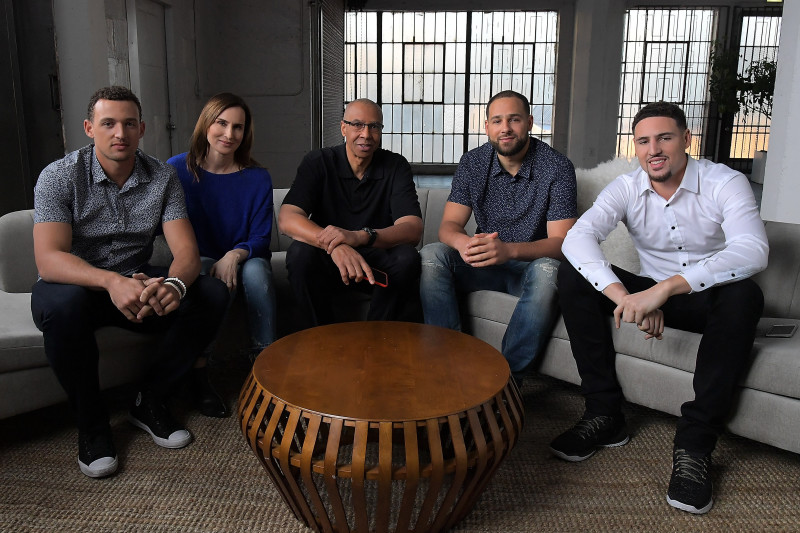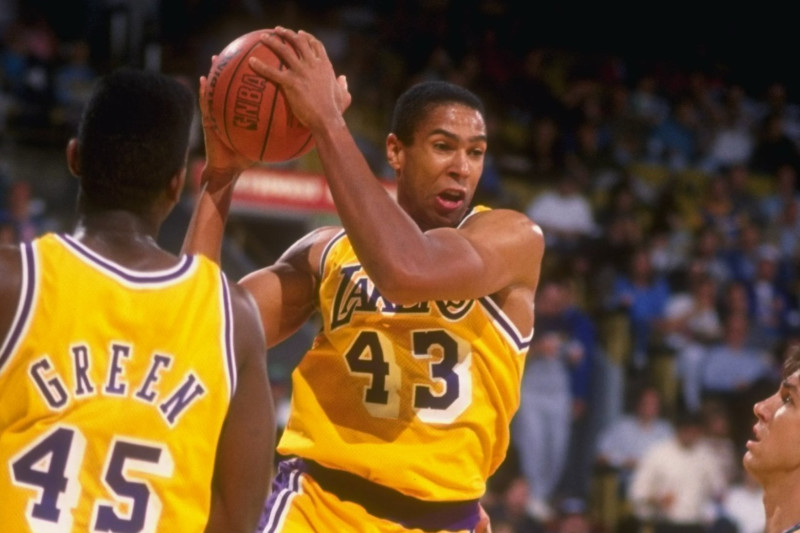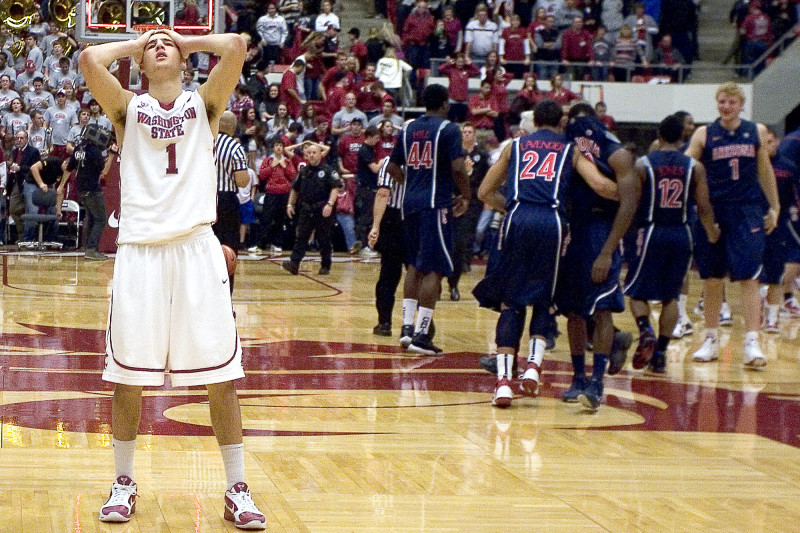It was a boy’s dream house. Maybe a handyman’s, too. It had a front yard big enough for a sandlot baseball diamond, complete with a stand of trees akin to Fenway’s Green Monster. The basketball hoop stood in the backyard driveway. The football field, aka the living room, featured a well-worn dark green couch, otherwise known as the end zone.
If there were any other feature that stood out about the house, it was that it had an amazing number of broken windows, especially since it was located in one of the most affluent neighborhoods in Portland, Oregon.
That house, and everything that happened in and around it, is a big reason why Klay Thompson has the mix of qualities that makes him unique among NBA players and indispensable to the Golden State Warriors’ winning formula. There is not another player with the skills of a star, the confidence of a closer, the work ethic of a defensive stopper, all while asking for no more attention than a 12th man. To understand why he is the way he is, you have to know how he grew up. And where. And with whom.
Mychal and Julie Thompson didn’t intend for their home to become an incubator for pro athletes. Though Mychal was the No. 1 overall pick of the Portland Trail Blazers in 1978 and a two-time NBA champion with the Los Angeles Lakers, and Julie a standout collegiate volleyball player and high school track and field star, they took a hands-off approach when it came to coaching their children, three boys less than three years apart in age—Mychel, Klay and Trayce.
Mychal was involved and supportive but limited himself to being the steady pitcher (and umpire) in their front-yard baseball games, rather than putting them through drills to assure they followed in his basketball footsteps. Julie, meanwhile, would teach them about the benefits of organic food and yoga when she wasn’t driving them to all their games in her trusty Toyota Land Cruiser. Still, she allowed them to indulge their wild sides.
And yet all three sons made it to the pros. Mychel, 29, just retired from a six-year basketball career, mostly in the NBA D-League. Trayce, 27, is an outfielder with the Chicago White Sox. Middle child Klay, of course, is pursuing his third championship and fourth consecutive NBA Finals appearance.
“I guess when my dad met my mom and they were dating, he did say, ‘If we have kids, they probably will be professional athletes,’ because my mom was really athletic, too,” Mychel says. “My mom said before we were born she would stay up all night trying to beat my dad in pingpong and pool, because my dad was good, I guess, when he was younger, so my mom would always play until she could beat him.
“But it was a great environment growing up. There was never any pressure. Trayce playing baseball shows we were allowed to do what we wanted to do. Trayce probably could’ve played D-I basketball, too, but he quit after his junior year of high school because he wanted to focus on baseball. My parents pretty much said, ‘If you don’t love it, why do it?’ Basketball, for me and Klay, we definitely loved it. Trayce slept with his bat.”

Trayce, Julie, Mychal, Mychel and Klay Thompson pose for a recent ad campaign.Charley Gallay/Getty Images
The boys dreamed of one day being pros, for sure—but how they did it was left up to them. Trayce was known to constantly practice his swing in the house. “It’s still a miracle he never hit anyone with the bat,” says Mychel, who did more damage with his head, accidentally knocking out one of his father’s teeth with it in an impromptu hoops game inside the house. Their fearlessness was honed early: Mychal and Julie were also known to play spirited games of tennis as their boys ran around on the court, tennis balls rocketing past their heads.
“My sister was big on naturopathy but not necessarily safety,” says Julie’s brother, John Leslie, a former center and linebacker at Occidental College. Mychal credits him for being a surrogate father to the boys when his duties as a player or broadcaster pulled him away from home.
“Piles of athletic shoes and broken windows—that was their house,” Leslie says. “If you knew the energy level—they were bouncing off the walls. My sister was big on teaching the boys to eat really healthy, but she’d tell me, ‘I took them to Toys R Us and got them six swords, and they lasted about a day before they were all broken.’ But our mom was a first-grade teacher, so they were also exposed to every early educational tool—Baby Einstein, all of that.”
In the fraternal games, Klay grew up in the vise grip of the older and taller Mychel and younger but stronger Trayce. His knack for scoring from long range developed because Mychel was not about to let him get anywhere near that backyard hoop, and both his ability to play through contact and high pain threshold can be attributed to those living room football games. The rules were simple: one brother on offense, the other two on defense. The brother with the ball tried to run around or through the other two. Land on the couch, touchdown. Fall short, next boy’s turn.
“Klay would struggle with that sometimes, but, yeah, you’d take a nosedive into the couch and take your brothers with you,” Mychel says. “If we did that now, we’d all get hurt. Back then, there was no fear at all.”
Especially Klay. He has a profound love for fireworks, a fascination inherited from his mother, and supposedly keeps a stockpile in a garage up in the Northwest. He grew up in Oregon’s great outdoors, and there wasn’t a tree he wouldn’t climb, a river he wouldn’t swim or a tall object he wouldn’t leap from. While it took Mychel all of one day to decide skateboarding was not for him, Klay had Uncle John take him to Portland’s famous Burnside Skatepark.
“Klay tried right away to drop into the bowl,” Mychel recalls. “Landed on his back and his butt and got hurt. Not badly hurt. But Klay was definitely the daredevil. Still is.”
Klay agrees—to a point. “My free-mindedness and fearlessness has faded as I’ve gotten older,” he says. “But as a kid, I was fearless. I try to still have that mentality, not in everyday life, but when I’m on the court.”

A No. 1 overall draft pick, Mychal Thompson won back-to-back titles when he became a role player with the Showtime-era Lakers.Ken Levine/Getty Images
He also inherited a sense of reclusiveness from his mom, too. “I’m really guarded,” Julie says. “I just want to have a good relationship with my kids. What I value is my family. Klay gets so much attention as it is. I try to be the one person who doesn’t give him extra attention. I want to be the one he can come to and just talk if that’s what he needs.”
For Klay, the most immediate circle is limited to his bulldog, Rocco. He was thrilled when the Oakland Athletics acquired Trayce this spring and it appeared they would be living together, in part because his brother and his dog “are great buddies” and “Trayce is a great uncle to Rocco.”
That his dating life—including a recent breakup with model Hannah Stocking—has made it into the public eye several times is a source of quiet embarrassment. His manner might be laid-back, but he clearly prefers his life to be as concisely ordered as his ultra-efficient and textbook shooting form. He is a “linear thinker,” Julie says.
“There’s work, and then there’s your private life, and you want to have some privacy and stability,” Klay says. “You don’t want everybody peering into everything you do. It used to bother me, but now I really don’t care. … You’re going to read that on the internet? Whatever.
“It’s not like I don’t care what people think. It’s like as long as I’m doing the job I love, taking care of my family and having fun, I can’t worry about what other people think too much. It’s unnecessary. It’s pressure for no reason. I used to beat myself up if there was something embarrassing. Now I’m like … we’re all human. I’m not the only one who has ever been through anything.”
Given the choice, he’d still be that boy disappearing into the Oregon woods.
That desire to blend in, to play whatever role the Warriors ask of him, has many layers, each one laid by the people he grew up with and around.
Start with an array of no-nonsense coaches, including former NFL quarterback Neil Lomax when he played football and Tony Bennett when Klay was a freshman at Washington State. “He never had any favors,” Julie says. “Mychal never coached him. They all had to prove themselves the other way.”
Then there were his teammates in Little League. They played for a city championship without Klay, who had been sidelined for six weeks with a broken foot. Nearly 20 years later, he still winces at the memory. “Sixth grade,” he says. “I had to miss my city league baseball championship. I was trying to leapfrog over a kid at recess, and I did, and I broke my foot. Embarrassing. I remember that. God, how embarrassing.”
There is an indestructible air about him—the fractured right thumb that forced him to miss nine games this season is by far the most severe injury he’s suffered and longest stretch he’s missed, he says, at any level since the broken foot.
It’s about more than just showing up, however. It’s about the way Thompson plays. Uncle John recalls when Washington State had the rare chance to host a non-Pac-12 Top Five team in Kansas State. It was a big deal for the Cougars, and Beasley Coliseum was packed. The Wildcats won even though Thompson was the game’s leading scorer with 16 points.

Klay Thompson took losses hard back when he was at Washington State, feeling as if he had let down his team and the program’s fans.Dean Hare/Associated Press
“Klay was just hang-dogging afterward, and I asked him why,” Leslie says. “He said, ‘I let 13,000 people down tonight.’
“It’s all about winning for him. Even now, I don’t think he’d be happy scoring 25 for some team and squeaking into the playoffs.”
That has been the case for some time, and Thompson appreciates how rare that can be, having watched his brothers toil for years—Mychel with the Santa Cruz Warriors and Trayce in the minor leagues.
“I learned a lot from Trayce because he had to go away at 18 and grind away in the minors for six years,” Klay says. “He was 24 years old before he got his shot, and he didn’t complain one time. He’s taken 10-hour bus rides to play back-to-back games. I would find myself complaining about a practice at 11 a.m., and then I’d be, ‘Wait a minute. Think about your bro, the hard work he had to put in just to have a chance at the bigs.’ I was able to get drafted and have a much better opportunity than him, so I always think about the professionalism that he has developed the last 10 years. It’s incredible.”
Given the chance, his inclination may be to run off to those woods with Rocco, but Mychel showed him the value of being social.
The Santa Cruz players live in a no-frills hotel during the season, so when Mychel was playing, he would roll up to Klay’s house whenever he could; it wasn’t long before he was bringing his teammates as well for the 90-minute trip.
“He’d invite the whole team up to the house in Oakland, and we’d barbecue or go out to dinner,” Klay says.
“At first I was like, ‘Why do I have eight dudes in my house?’ But then I was like, ‘I know what they’re going through. I completely understand it.’ And I told them: ‘You guys are welcome to come to my home and enjoy yourselves.’ Because the D-League can be a grind, just like the minors—sitting in hotel after hotel. They probably just wanted to have that home feeling. They’d come up to the house and just kick it, and I just thought, ‘Man, Myke is a good teammate to let these guys do this.’ He’s just a good soul. He cares for other people. That’s what I learned from him, and that’s what everybody says about him.”
While Mychal made no concerted effort to have his son follow in his footsteps, Klay did so anyway, in a multitude of ways. Most beneficial to the Warriors was Mychal’s example to Klay of how being part of a championship team can be more rewarding than being the star of a lesser squad. While Mychal was a starter who flirted with double-double averages on perennial playoff teams in Portland, it wasn’t until he joined the Lakers as a supersub that he won two championships, in 1987 and ’88. Klay credits those titles for his dad’s having a street named after him back on his native island, the Bahamas.
“He averaged 20 and 10 one year and didn’t make the All-Star Game,” Mychel says of his dad. “I think he was a pretty big name, then he goes to the Lakers, comes off the bench and does all the little things.”
That included taking pride in his defense, a habit Klay picked up. “Anyone scoring on Klay bugs him,” Mychel says. “I think he got that from my dad, too. My dad was the same way. … And then seeing early in his career the success of doing those things has made it second nature for Klay now.”
Thompson’s defense is a tool the Warriors have used, and relied on, throughout their three straight Finals runs, but on paper, it isn’t a given they can rely on for the rest of his career. Free agency is a little more than a year away for Thompson, and with the Warriors having already made a large financial commitment to Stephen Curry, and with Kevin Durant and Draymond Green likely next, it’s fair to speculate whether Golden State will pay up for Thompson, too, and if Klay will want his own team.

Mychel attributes Klay’s defensive tenacity to their father.Marcio Jose Sanchez/Associated Press
But Klay recalls joining the Warriors when they weren’t even a playoff team, much less a title contender.
“I was part of building this culture,” he says. “It wouldn’t be leaving everything I worked for behind, but it would be a whole new start. I was one of the pioneers of this. I’m one of the longest-tenured players here besides Steph, so I’m very prideful of the turnaround the Warriors have made. Just because I’m not the face of the franchise doesn’t mean I’m not recognized for it. Real fans and the people in the organization and my peers around the league, they see the work I’ve put in and realize I’ve been a huge component to the success here for the last five, six, seven years, so I have an identity here. It would be hard for me to envision going anywhere else.”
Just as it’s hard for him to imagine having grown up anywhere else. With anyone else.
“My brothers were definitely a huge influence because we would play so hard against each other in whatever sport it was,” he says. “They allowed me to be the competitor I am today.”
Back in the dream house that was.